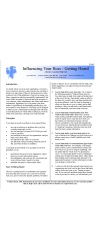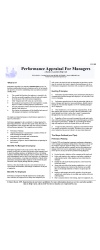If it wasn’t for the managers, communication about employee performance could work very well. Here are common errors
Performance appraisals are probably the most misused, and goofed-up management tool in existence. Starting from misunderstanding the whole point of appraisals, right on through to use of poor communication with employees, managers make a fairly consistent set of mistakes about employee reviews, and performance appraisals. Here’s some of them in the fourth in our series of common managerial mistakes.
Since there are a fair number of errors made by managers in the performance appraisal and employee review process, we’ll approach this set in brief point form. Stay tuned since we’ll be dealing with a few more performance appraisal errors in a future article in this series. Until then here’s the first five.
Focusing on the Form:
Most managers are given specific forms to fill out to record the results of performance appraisals and reviews. Apart from the fact that most forms aren’t really effective in creating better performance, it’s easy for managers to believe that performance appraisal is about, and only about, getting the forms in on time (which they don’t). Performance appraisal isn’t about the form. It’s about the process.
Focusing on The Appraisal, Not the Planning:
Appraisals are usually done (at leat formally), once a year, covering the period preceding. The problem is that it’s looking backward, and you can’t change what’s happened in the past. The focus (and time invested) should be on the upfront planning for performance, since we can influence the present and future. Clear shared understanding of performance expectations is powerful.
Doing To the Employee, Not Working With:
There’s a sense, on the part of many, that the performance appraisal involves doing something TO the employee (i.e. telling them how they have done). While communicating the manager’s perceptions is not a completely bad thing, when it is the ONLY thing, it loses power. Performance discussions should be dialogues. One of the most important reasons to create performance dialogues is to foster the ability to self-evaluate on the part of employees. That makes for better performance, and less work for the manager.
Surprises:
If there’s one fundamental rule for employee reviews (there’s actually a number of fundamental rules and principles), it’s this: There should never be any surprises for the employee. Managers sometimes forget. If there is anything the manager brings out in the employee review that is new to the employee, the manager has not been doing his or her job communicating with the employee.
Procrastinating:
Let’s face it. Managers don’t particular like to do employee reviews, often because they don’t realize the benefits of doing them properly, or because they haven’t been exposed to the process that will make them painless, and productive. Regardless of reasons, it’s common for employee reviews to be scheduled, then postponed, or otherwise delayed. This sends an important message to employees: “Performance appraisals aren’t important around here”. If we want employees to take them seriously, managers need to take them seriously, and demonstrate their importance through action.
Conclusion
Despite the belief that traditional performance reviews have failed on the part of both managers and employees, it IS possible to improve the process by eliminating these managerial mistakes.
Of course there’s more to making performance management and performance evaluation than getting managers to avoid mistakes. Systems need to be changed, and attitudes need to shift.
For more on how to integrate reviews with the other components of a performance MANAGEMENT system, drop by The Performance Management & Appraisal Resource Center.
For more in this series check out: Common Managerial Mistakes Series: Exhorting Employees To Work Harder here on Medium.






